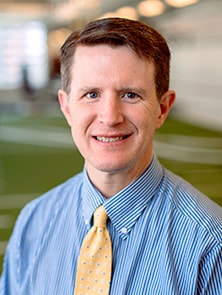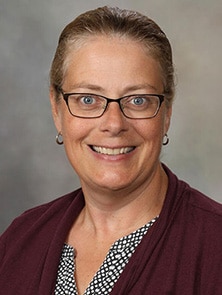/prod01/channel_2/media/mccms/content-assets/academics/health-sciences-training/physical-therapy-neurologic-residency-minnesota/BrandiBrian_512X512.jpg)
Brandi Brian, M.S., P.T., DScPT
Board Certified Clinical Specialist in Neurologic Physical Therapy
/prod01/channel_2/media/mccms/content-assets/academics/health-sciences-training/physical-therapy-neurologic-residency-minnesota/PTResNeuro_Curriculum_1024X512.jpg)
The Physical Therapy Neurologic Residency is a full-time, 54-week program. You experience more than 1,500 hours of clinical practice, including more than 150 hours of individual mentored time from highly trained and board-certified physical therapists and over 300 education hours.
Didactic and laboratory education is integrated throughout the curriculum and modeled after the neurologic physical therapy description of residency practice in the following areas:
Foundational classes
Acquired and traumatic brain injury topics
Spinal cord injury topics
Miscellaneous topics
Neurodegenerative disease/pediatrics/neurology topics
Requirements for residency completion include presenting at journal clubs and educational rounds, as well as completing a final research project chosen from one of these options:
Other curriculum content and directed learning activities include assisting with teaching lectures and laboratory coursework, clinical mentoring and teaching lectures, and observing other medical specialty practices.
Mayo Clinic School of Health Sciences is committed to developing and maintaining the best education programs. The curriculum and other aspects of this program are routinely assessed and changed as necessary to ensure the highest quality training.
For the majority of the residency, the learning schedule includes eight-hour days, five days a week. Independent learning and assignments may occur outside of this time frame.
/0x0:512x512/prod01/channel_2/media/mccms/content-assets/academics/health-sciences-training/physical-therapy-neurologic-residency-minnesota/nicholas-staffieri-512X512-30361047_20240805.jpg)
When considering Neurologic Physical Therapy Residencies, I felt that Mayo Clinic offered the most well-rounded program. As a resident, Mayo allows you to participate in countless continuing education courses, delve into research, gain teaching experience, and receive invaluable insight across the continuum of care from some of the most seasoned mentors. For an institution that boasts of its ability to optimize professional growth, the experience you will have at Mayo Clinic is unmatched.
Nick Staffieri, P.T., D.P.T.
Class of 2024-2025
The Physical Therapy Neurologic Residency is coordinated and taught by the clinical, scientific, and technical staffs of Mayo Clinic. Faculty members are chosen for their commitment to teaching, as well as their clinical practice and research. Many are board-certified specialists in neurology.
Emily Axelson, M.S., CCC-SLP
Allison Bauer, O.T., O.T.D.
Lisa Beck, APRN, CNS, M.S.
Brandi Brian, M.S., P.T., DScPT
Board-Certified Clinical Specialist in Neurologic Physical Therapy
Heather Ducharme, P.T., D.P.T., A.T.C.
Darren Calley, P.T., DScPT
Board-Certified Clinical Specialist in Orthopaedic Physical Therapy
Darcy Dalen, P.T., D.P.T.
Board-Certified Clinical Specialist in Neurologic Physical Therapy
Amber DeBuhr O.T., MOT
Staci Eischen, P.T.
Board-Certified Clinical Specialist in Neurologic Physical Therapy
Dmitry Esterov, D.O.
Nathan Hellyer, P.T., Ph.D.
John Hollman, P.T., Ph.D.
Ellie Hukriede CCC SLP
Kayla Johnson PT, DPT
Board-Certified Clinical Specialist in Neurologic Physical Therapy
Debra Ness, P.T., DScPT
Board-Certified Clinical Specialist in Neurologic Physical Therapy
Michael Orte, P.T., D.P.T.
Board-Certified Clinical Specialist in Neurologic Physical Therapy
Aaron Rindflesch, P.T., Ph.D.
Board-Certified Clinical Specialist in Neurologic Physical Therapy
Kristin Sicotte, P.T., D.P.T.
Ross Terman C.O. L.O.
Rebecca Wessel, M.B.A.
Rachel Wilson, P.T., D.P.T
Board-Certified Clinical Specialist in Neurologic Physical Therapy
Natalie Woodberry, P.T., D.P.T.
Board-Certified Clinical Specialist in Pediatric Physical Therapy

Dr. Calley is the director of the neurologic, orthopaedic, and sports physical therapy residencies at Mayo Clinic's campus in Rochester, Minnesota, and is a core faculty member for the Physical Therapy Program at Mayo Clinic in Minnesota. He helped organize and create the clinical and didactic curriculum utilized in the Mayo Clinic physical therapy, orthopaedic, and sports residencies, and serves as a primary mentor and core faculty member for these programs.
He is a 1996 graduate of Mayo Clinic School of Health Sciences' Physical Therapy Program. In 2006, he became a board-certified specialist in orthopedics, and in 2009 he earned a DScPT degree through the University of Maryland. Dr. Calley is an assistant professor of physical therapy at Mayo Clinic College of Medicine and Science. His research interests include musculoskeletal examination, psychosocial factors, and clinical and residency education.
With a strong background in clinical and residency education, Dr. Calley served 10 years as an outpatient clinical education coordinator and 9 years as the residency coordinator of the Mayo Clinic Physical Therapy Orthopaedic Residency in Rochester, Minnesota, where he has been a primary clinical instructor to more than 175 physical therapy students and a mentor to over 28 residents in an outpatient orthopedic setting. He is a member of the American Physical Therapy Association, the Orthopaedic and Education Academies, and several Orthopaedic Academy Special Interest Groups.
 Debra Ness P.T., DScPT, NCS has served as the residency coordinator since 2016, and the assistant program director for the Mayo Clinic Physical Therapy Neurologic Residency since 2022. Dr. Ness received her Bachelor of Arts from Concordia College in Moorhead, Minnesota, her Master of Physical Therapy from Mayo Clinic School of Health Sciences, and her Doctorate of Science from the University of Maryland, Baltimore. She received her neurologic clinical specialization in 2009 and recertification in 2019.
Debra Ness P.T., DScPT, NCS has served as the residency coordinator since 2016, and the assistant program director for the Mayo Clinic Physical Therapy Neurologic Residency since 2022. Dr. Ness received her Bachelor of Arts from Concordia College in Moorhead, Minnesota, her Master of Physical Therapy from Mayo Clinic School of Health Sciences, and her Doctorate of Science from the University of Maryland, Baltimore. She received her neurologic clinical specialization in 2009 and recertification in 2019.
Dr. Ness is a core didactic faculty member and mentor in the Neurologic Residency. In addition, she is an assistant professor in Mayo School of Health Sciences and teaches in both the academic and clinical settings for the Mayo Clinic Doctor of Physical Therapy Program. Dr. Ness is supervisor for the neurologic practice in the Department of Physical Medicine and Rehabilitation. She is an invited reviewer for the Archives of Physical Medicine and Rehabilitation and the McMaster University online rating of evidence program. She has co-authored or authored seven peer-reviewed articles on neurologic topics. Dr. Ness is a member of the APTA Academy of Neurologic PT and the residency and fellowship special interest groups.
A hallmark of higher education excellence is the breadth and depth of information and experience provided to you by faculty and visiting experts. Each year, many prominent professors visit Mayo Clinic to lecture in their areas of medical and scientific expertise.
As a resident at Mayo Clinic School of Health Sciences, you are encouraged to learn from these valuable resources by attending all relevant conferences, lectures, and seminars prepared for students, interns, residents, fellows, and consulting staff.
Mayo Clinic's campus in Rochester, Minnesota, includes an extensive outpatient complex, Mayo Clinic Hospital — Rochester, and substantial research and education facilities. This Mayo Clinic site is among the largest, most advanced medical centers in the world.
During the program, residents spend the majority of their time at Mayo Clinic Hospital — Rochester, Saint Marys Campus.
/0x0:480x480/prod01/channel_2/media/mccms/content-assets/academics/residencies-and-fellowships/internal-medicine-residency-minnesota/3760365_0029-rochester-campus-1440X480.jpg)
Tour the Mayo Clinic Occupational Therapy Fellowships and Physical Therapy Residencies
7:12
Mayo Clinic School of Health Sciences uses these evaluative tools:
Mayo Clinic's system of evaluation provides students and faculty with a comprehensive look at individual performance. This allows faculty and administrative staff to direct students who are experiencing academic difficulty to the appropriate support resources, including tutoring programs and counseling opportunities.